- Home
- J. R. Ellis
The Body in the Dales Page 11
The Body in the Dales Read online
Page 11
I’ll bet you used stronger language than that, thought Carter. He looked again at Cartwright’s large bulk. Was he too big to get through the narrow passages? If so, maybe he had a thinner accomplice. How could you ever know unless you measured the man and then measured every narrow passage in the system? Carter frowned. He could foresee Oldroyd giving him a rather cold, wet and difficult task to oversee.
‘So altogether, then, you don’t have much to do with the caving people round here?’
‘No, I don’t.’
‘But you know your way around the systems.’
‘As well as anyone, I suppose.’
Carter moved in for the kill.
‘Well enough to carry a body down there and dump it?’
Cartwright snorted with derision.
‘So you think it was me?’
‘I didn’t say that, sir.’
‘Why would I do him in, anyway? That would only make sure that I didn’t get me money back.’
‘You’ve got a bit of a temper though, haven’t you, sir?’
‘What do yer mean?’ growled Cartwright, ironically confirming Carter’s accusation. DC Robinson moved closer.
‘I mean, sir, did you have an argument with Mr Atkins which got out of control and ended with you hitting him on the head with a hammer? I see you’ve got plenty of them.’ Carter turned to the battered workbench on which lay a number of weighty ball-pein hammers with oily and blackened handles.
‘I see. You think I bashed him over th’ead. Well, I’d a good mind to, but I didn’t. I want anybody who owes me any brass to stay around and bloody well pay me.’
‘So you don’t deny that you had considered being violent towards him?’
‘Of course, I wanted to tear t’bugger limb from limb, but I didn’t.’
‘When did you last see Mr Atkins?’
Cartwright sat on the bonnet of the van and considered.
‘He was in t’Red Horse one night about a week since wi’ some of his mates, loud-mouthed as ever.’
That was consistent with what Trevor Booth, the landlord of the Red Horse, had said.
‘What was he bragging about?’
Cartwright grunted contemptuously.
‘Money. He wor always going on abaht how much brass he ’ad, though ’ow he made it wor a mystery, and he didn’t pay what he owed folk.’ He glared at Carter as he emphasised the point for the umpteenth time. ‘He wor going on abaht women too, saying he’d got a new one.’
‘And that got on people’s nerves?’
‘It bloody did, ’cos most of his brass he owed to other folk and the women he had were other blokes’ wives.’
‘Who else was in the pub that night?’
‘Plenty folk; it wor jam packed as usual.’
‘Any of Mr Atkins’s particular enemies?’
Cartwright scowled.
‘Besides me, yer mean? Aye, lots of ’em, probably everybody in t’bloody place apart from one or two of his drinking mates.’
‘Did you see him leave?’
‘No, I don’t remember that. I think he was still in t’pub when I left.’
‘Did you see anything else unusual that night?’
‘Such as what?’
‘Anything.’
Cartwright shook his head. ‘No, but . . .’
‘What?’
‘The only thing I remember was when I left, I saw a woman standing in t’lane at t’side o’ t’pub.’
‘Could you see who it was?’
‘No, she wor too much in t’dark, but I thought it were a bit funny, the way she wor just standing there. I’ve thought since that it might’ve been Atkins’s new woman waiting for him; maybe she bumped him off.’ Cartwright laughed heartily at this; he seemed to find the idea hilarious.
‘Anyway,’ he said when his laughter had subsided. ‘Have you finished all these bloody questions? I’ve got work to do. And when are you going to do summat about me money?’
Carter smiled and decided it was time to bring the interview to an end before the conversation went down that road yet again.
‘Thank you, Mr Cartwright, you’ve been very helpful. We won’t keep you from your work for a moment longer.’
The big man grunted and pulled down his goggles. Then he grabbed the welding torch and disappeared back beneath the van without a word. Almost immediately, the hammering began again.
DC Robinson smiled at Carter, who shook his head. They had almost got out of the ramshackle place when a voice bellowed: ‘Well, put t’radio back on!’
As Carter was dealing with Cartwright for the second time, Inspector Craven was in Ingleton. He didn’t normally like working with CID people, especially if they came from one of the large cities like Leeds or Sheffield. He found their attitudes patronising. He felt they regarded him and his colleagues as country bumpkins policing tranquil places where nothing much of a criminal nature happened except tractors breaking the speed limit and visitors dropping litter.
The exception was DCI Oldroyd, who had a deep love for the Dales. Beneath the mild exterior he knew Oldroyd was a serious and tenacious character, but he liked his sense of humour and knew that, like him, he was Yorkshire through and through and very attached to the landscape.
So Craven didn’t mind when Detective Sergeant Carter, the new member of Oldroyd’s team, rang to ask for help in finding out more about the caving community. While his team took statements from all the members of the Cave Rescue team who had brought up the body, he made a visit to one of his favourite haunts: Johnny’s Café in Ingleton, run by no less than Alan Williams, head of the Wharfedale Cave Rescue.
Craven was a child of the Dales. He’d been brought up in Grassington and his father and several generations before him had been farm workers. His earliest memories were of watching his father doing the milking and of climbing up into the lofts of the lathe barns where the hay was stored for the winter. He also remembered the village bobby (the community constable in today’s jargon), a man they all feared and admired in about equal measure. He gave them extra-strong mints, which made their eyes water, from a bag in his pocket, but woe betide them if he caught them doing something they shouldn’t, like climbing on to the roof of a garage and firing stones at people from their catapults. Innocent days, thought Craven as he walked through Ingleton. That village policeman had undoubtedly inspired him to enter the police himself, but goodness knows what he would have made of the modern, bureaucratic and computerised force.
Craven walked under the impressive railway viaduct in the centre of the small town and thought of the first Dales tourists in Victorian times. Many were genteel visitors from the industrial towns and cities who must, especially the women, have discovered that they were inappropriately dressed even for the comparatively light demands of Ingleton’s famous waterfall walk. But there were others, pioneering individuals who carried on the explorations begun by local people into the mysterious caves and potholes in the area and who went down with candles and ropes into the black, uncharted depths. Men like the Frenchman Edouard-Alfred Martel, who made the first successful descent of the 340-foot main shaft of Gaping Ghyll in 1895, using wood and rope ladders. He stayed in the huge main chamber, which must have been a terrifying spectacle to see for the first time, illuminated only by candlelight, for two hours and produced a sketch map.
Martel’s modern successors gathered in places like Johnny’s, a well-known climbers’ and potholers’ café. Tables were set out in front of a huge menu board that listed enormous breakfasts and fry-ups together with tea by the half pint or pint.
Both sides of the room were festooned with climbing and potholing gear, cagoules, guide books, walking books, tents and trangia stoves, ropes, karabiners and maillons. There was a counter for service if you wanted to buy any of these items and a hatch for ordering food. At the back was a corridor through to the toilets and to a shower, provided so that people returning from deep underground could clean off the mud and grime.
Johnny’s
was never empty. At any time through the day you could be guaranteed to find a group of men, and sometimes women too, sitting with mugs of tea and enjoying the craic. Craven was hoping to talk to some of the caving fraternity who might be able to shed some light on the mysterious crime, which he knew would have been deeply shocking to them. Death was, unfortunately, not rare in this dangerous pursuit, but murder: that was another matter. A caver found murdered in a cave meant that the murderer was almost certainly one of their number. This made the crime not only terrible in itself, but also a blow against the camaraderie of men and women who often trusted each other with their lives.
As Craven entered the café, he was relieved to see a group of men he vaguely knew, sitting around a table with the usual pots of tea. He went over to the hatch and ordered tea and a bacon sandwich before walking over to join them. Alan Williams was behind the shop counter and nodded a greeting to Craven. This would need careful handling. Cavers didn’t always like to be interrupted, especially if they were doing some serious planning or comparing notes.
‘Mind if I join you?’
Things immediately went quiet but the faces that turned to him were not unfriendly. Craven was respected; he had liaised many times with the fell rescue organisations in the area when there was a serious emergency. He was always careful to let the rescuers handle things their way and not to be the interfering policeman. After all, they were the experts.
‘Inspector Craven.’
‘Aye we know who you are.’
‘And I think you probably know why I want to talk to you.’
‘Aye.’ A number of the men shook their heads glumly.
‘We were just talking about it. It’s a bloody awful business; bloke murdered in a cave.’
‘We don’t think he was actually murdered in the cave; his body was dumped down there after he was killed.’
‘Whatever,’ muttered a solidly built individual with a shaved head as he grasped his pint pot of tea and swigged from it.
‘Dumped halfway through Jingling Pot?’ broke in a wiry but strong-looking individual whom Craven could imagine crawling powerfully along through the narrowest of tunnels. ‘That’s bloody daft, isn’t it?’
‘I agree with you, but that’s where he was found.’
‘And who the hell do you think did it?’
Craven sat down at the end of his table as his tea arrived.
‘That’s where I thought some of you lads might be able to give me a hand,’ he said, and immediately regretted the way he’d phrased it.
‘What the ’ell do you mean by that?’ A burly man with shaggy black hair turned a mean-looking face on Craven.
‘Are you saying it were one of us? Bloody coppers. Why don’t you just f—’
‘Norman, just shut it. The bloke’s only doing his job.’ This was from the first man who’d spoken. He had a greying moustache, seemed slightly older than the others and had an air of authority. Craven suddenly remembered who he was: Pete Dukinfield, a caver and an expert in subterranean photography who had become quite famous in the local area. Some of his footage had been shown on television.
Craven hastened to correct himself.
‘No, I didn’t mean it like that but,’ Craven tried to stay firm, ‘you know, stories get around, don’t they? Have you heard anything unusual?’
There was silence and a few shaken heads.
‘Do you think anybody could have got that body down there unless they knew a bit about caves?’
Still nothing apart from a few murmurs. The shaved head and the shaggy head both looked down. They all knew Craven was right, and that made it so much worse. The murderer had to be a caver.
‘Did any of you know him?’
‘I don’t even know who it was.’
‘David Atkins from Burnthwaite.’
‘Why don’t you ask them all over in Wharfedale; that’s where he’d be a member, wouldn’t it?’
‘We are, don’t worry, but I wanted to ask around a bit, you know. We need all the help we can get.’
There were one or two murmured conversations.
‘Aye, we knew him a bit,’ said another of the group. ‘Bit of a bugger by all accounts.’
‘How did you know him?’
‘He came on a few trips with us. Him and that big bloke who runs the garage in Burnthwaite.’
‘Aye,’ laughed another. ‘Have you seen that place? It’s a right crap ’ole, falling to bits and piled up wi’ old cars and stuff.’
‘You mean Sam Cartwright.’ Craven was on the alert. He’d had a report of Oldroyd and Carter’s encounter with Cartwright in the Red Horse.
‘Aye, that’s him. The only problem is, he can only go on certain routes he’s such a big fat bastard.’ This produced raucous laughter.
‘He nearly got stuck when he went down with us. Martin had to push the bugger from behind. You should have heard the bloody language.’
Craven’s bacon sandwich arrived. He opened it and applied a liberal amount of brown sauce to the bacon.
‘Would he get through the Jingling Pot system?’
‘I haven’t seen him for a bit but I don’t think so. He’s a good caver, don’t get me wrong, but he’s just too bloody big.’
‘He’s strong, though; he could lift a body?’
‘I suppose so, but I don’t know about moving it by himself. Bodies are heavy, especially dead ones. We’ve handled a few in Cave Rescue.’
Craven briefly considered this gruesome image before continuing.
‘So you think it must have been the work of more than one person?’
‘Aye, must have been, mustn’t it? But why is a different matter.’
‘Did they seem good friends then, Atkins and Cartwright?’
‘Can’t tell really, didn’t know them well enough, but you don’t go caving with people you don’t get on with, I can tell you that.’
There were nods of agreement around the table. Craven continued.
‘You see, we know that Cartwright and Atkins had had a big fall-out. Atkins owed him money.’
‘That’s no surprise. I hear he was a right slippery sod where brass was concerned.’
Craven took a drink of his neglected tea, which was already cooling. A sullen quiet had descended on the table.
‘Is there anything else you know about Atkins, or about why anyone should dump his body down there?’
Pete Dukinfield replied.
‘I think I speak for everyone, Inspector. We’re baffled by it all too. It’s a bad enough business when anyone dies caving but a murder’s just . . . terrible. We hope you find out who did it. And when you do, just take ’em to the edge of Gaping Ghyll and push ’em down. That’s what they bloody well deserve.’
There was another chorus of ‘ayes’ around the table. The hurt they felt at this betrayal of the caving fraternity went deep.
At this point the door opened and a group of three bedraggled-looking cavers came in. They were wearing mud-stained fleeces over wetsuits. Their faces were dirty and they looked exhausted. Craven suddenly ceased to be the centre of attention as the whole table greeted the newcomers.
‘Bloody hell, you’re back soon. What happened?’ said the shaven head.
‘It’s a bloody dead end, should have known, went all round the pool, black as pitch and bloody freezing, but there’s no way through.’
‘Shit! I’m not surprised though.’
‘Had to pack it in early, Steve’s not well. He’s out in the car, puked up when we got back out.’
‘Was he on the piss last night?’ This caused general sniggering. Craven decided that this was the moment to make his escape and he left them reflecting over another failed exploration. That must be the story most of the time, thought Craven as he walked back through the village. How rare it was to find new tunnels and passages, the holy grail of caving.
The visit to the café had been as disappointing as the cavers’ failed underwater explorations except for the interesting information that Ca
rtwright and Atkins had once been friends. The investigation, like the dead end in the pool, seemed to have no way forward.
In Burnthwaite, a solitary and anxious-looking figure was sitting in a corner of one of the bars in the Red Horse. John Baxter was also a member of the caving fraternity and another one of the team who had helped the police to bring Atkins’s body to the surface. He had been very quiet while the police had been asking all the questions because disturbing thoughts were beginning to trouble him even then.
Since yesterday morning it had been hell. He didn’t know what to do. Should he tell the police what he suspected? If he was wrong it would cause no end of trouble, but how could he be wrong? There was no other explanation. A shiver went through him as he faced again the significance of what he knew.
He finished his drink and looked nervously about him. It was quite early and the pub was half empty but he didn’t want to bump into anyone he knew, one person especially. He took a deep breath and decided he must take action. He couldn’t go on like this; he would have to ring the police. They’d all been given the telephone number of that inspector who was in charge of the murder enquiry: Inspector Oldroyd. He would go back home and ring him now.
Casting furtive glances around him, Baxter moved quickly out of the bar and down the short, narrow corridor where Oldroyd and Carter had been confronted by Cartwright. Unfortunately for him, he was seen leaving by a figure standing in the shadows in the lane at the side of the pub and quietly followed.
Outside it was a warm, still evening but, as it was late August, the light was already starting to fade. Baxter walked quickly along the streets until he reached his house, a large converted barn tucked behind a row of cottages. He was a joiner by trade and his van was parked in the short lane leading from the road. Inside the house he hesitated again and then walked through a wide hall into his sitting room. A bachelor, Baxter was extremely house-proud and everywhere showed ample evidence of his professional skills. He had done most of the work of the conversion himself and was particularly proud of this room, which had a wooden spiral staircase up to a mezzanine floor above. Through large patio doors there was a panoramic view across the fields and the drystone walls down to the River Wharfe and the fells beyond.

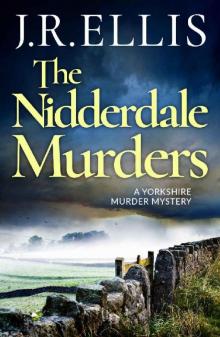 The Nidderdale Murders (A Yorkshire Murder Mystery)
The Nidderdale Murders (A Yorkshire Murder Mystery)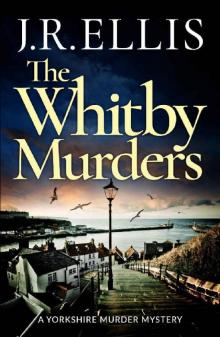 The Whitby Murders (A Yorkshire Murder Mystery)
The Whitby Murders (A Yorkshire Murder Mystery)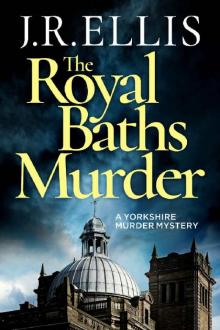 The Royal Baths Murder
The Royal Baths Murder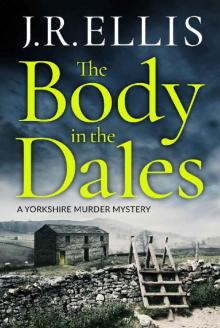 The Body in the Dales
The Body in the Dales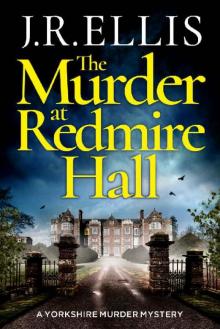 The Murder at Redmire Hall
The Murder at Redmire Hall